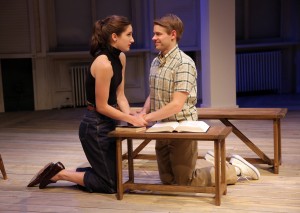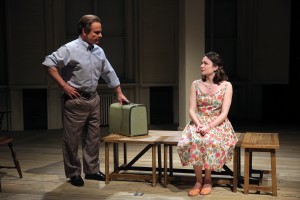No one familiar with A.R. Gurney will be surprised that his new play, Family Furniture, is set near Buffalo, New York, or that four of the five characters are white Anglo-Saxon Episcopalians. Those things, though, are about all that’s predictable in Gurney’s touching new comedy, currently at the Flea Theater in a crackerjack production directed by Tony nominee Thomas Kail.
Over a five-decade writing career, Gurney has chronicled middle and upper-middle class Protestants with a perspicacity comparable to that with which his contemporary Philip Roth approaches middle and upper-middle class Jews. In Gurney's compactly structured new play, as also in Roth's novella Goodbye, Columbus, a sensitive young man is altered in the course of a 1950s summer by disorienting discoveries about those around him and his social milieu. Both Roth and Gurney's protagonists head into autumn altogether more worldly than they were in June.
Gurney depicts a prosperous U.S. in which Cold War anxiety is taking the edge off the elation of World War II victory. The location is a summer colony on the Canadian shore of Lake Erie, close enough to Buffalo for paterfamilias Russell (Peter Scolari, familiar most recently, as Lena Dunham’s father on Girls) to commute on weekdays. While Russell carries on with the breadwinner's routine, his wife, Claire (Carolyn McCormick, widely known as pathologist Dr. Olivet on Law & Order), luxuriates in weeks of vacation. The play’s events unfold against a backdrop of the Army-McCarthy hearings, a political spectacle which Americans are following in "real-time" on their newly acquired television sets. As Russell observes, the world has "changed radically ... since the war." In his own household, for instance, the comforting verities of white Anglo-Saxon Protestant (WASP) culture are under siege: daughter Peggy (Ismenia Mendes) may soon be engaged to an Italian-American from a working-class family; and son Nick (Andrew Keenan-Bolger), a college junior, is dating Betsy, a Jewish woman (Molly Nordin) who's coaching him to think far more critically about literature and especially about matters social and political.
Russell is liberal-minded about Buffalo's increasing diversity, but he's uneasy at the prospect of the children marrying outside his Anglo-Saxon comfort zone. “We all need roots,” he says. “Deep roots, tap roots, you might call them. And we don’t last long without them.” Russell aims to be tolerant (within certain bounds): “I like to think we are able to embrace the future without denying the past.” Denial, however, is the thing at which he most excels.
From curtain-up, Gurney’s characters reveal what dab hands they are at maintaining secrets and ignoring reality. Claire, ostensibly alone on an overnight shopping trip in Manhattan, has dropped out of sight. She reappears pretty quickly; but her explanations for this and other absences never quite add up. Nick is confident he knows what's going on; and he assumes poor Russell has been snowed by his wife's lame excuses. Betsy, the play's non-WASP, declares that Russell “must be very naïve.” Defensive about his father's predicament, Nick shuts down the discussion, telling Betsy his father's “a complicated guy.” What Nick doesn't yet understand is the societal compact by which his parents and their forebears have managed to rise above social breaches and personal affronts that, if acknowledged, might capsize friendships, wreck marriages and swamp families. This tacit covenant is at the heart of Family Furniture; and, by placing it there, Gurney suggests it is, or used to be, essential to WASP culture. Speaking of the kinds of secrets with which Family Furniture deals — among them, infidelity, inconvenient pregnancy, abortion, feuds and embarrassing break-ups — Claire tells Nick: “People can know and not know … [a]nd still get along famously.”
Family Furniture is felicitously cast with a combination of seasoned pros and well-trained younger actors, all of whom understand that, in Gurney's script, what's unsaid is as important as what's said. The playwright's stage directions call for scenic design that’s as elliptical as his dialogue — “simple and somewhat abstract.” Rachel Hauck (set design) and Andrew Diaz (props) have taken Gurney at his word, creating a suggestive, uncluttered environment, furnished with readily moveable benches and tables, utilizing the imagination of both performers and audience. Claudia Brown’s costumes reflect the handsome styles of the Eisenhower era and the timeless taste of the Ivy Leaguers who populate Gurney’s universe. Betsy Adams’s lighting evokes the season's progression, early summer to Labor Day, and since the production has no detailed scenery, suggests the distinction between interiors and exteriors.
Gurney and Roth belong to the remnant of a generation that brought insights of post-Freudian psychology, plus unprecedented sexual candor, to fiction and drama. While Roth recently declared an end to his literary career, Gurney, at 83, is going strong. He may be looking backward in Family Furniture to the era of Goodbye, Columbus, but his swift exposition, efficient dialogue, and the play's relatively brief running time (sans intermission) belong to the zippy, impatient theater of today. And Gurney's authorial voice has irony enough to mark him as a denizen of the 21st-century. Family Furniture invites us, for a hundred minutes or so, to ponder a social convention that, according to Gurney, has saved face, spared feelings and, in some instances, kept families intact. Now's the time to do so: it's a self-willed naivety unlikely to survive social media, Internet gossip and the bluntness of our current tell-all, know-all discourse.
Family Furniture by A.R. Gurney presented by The Flea Theater, 41 White Street between Broadway and Church Street in TriBeCa, runs Tuesdays through Saturdays at 7 p.m., Saturdays and Sundays at 3 p.m., through Sunday, December 22. Tickets are $15, $30, $50 and $70, and may be purchased by calling 212-352-3101 or visiting www.theflea.org.



